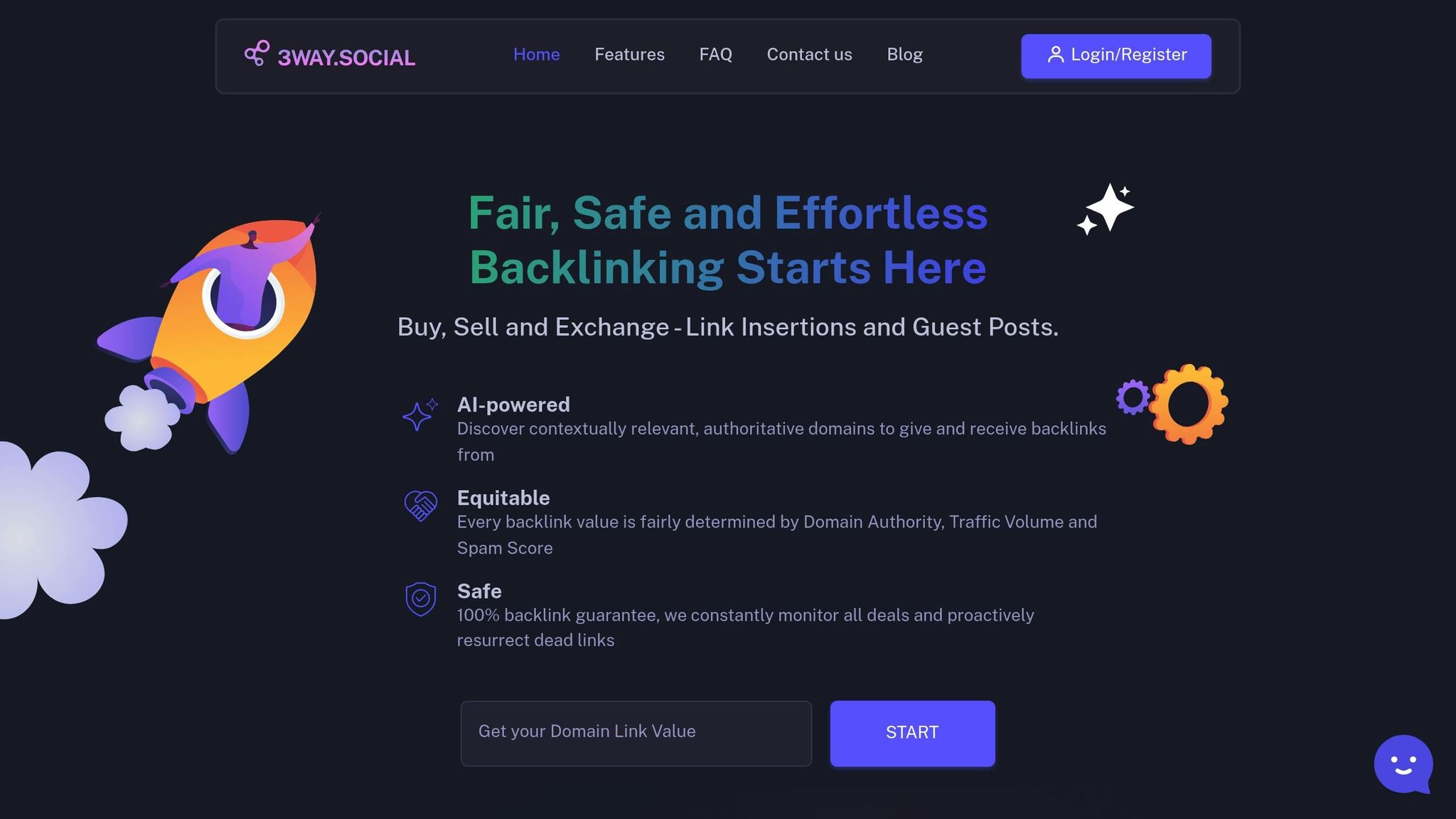Last Updated on June 27, 2025 by Becky Halls
Niche guest posting is a targeted strategy for improving SEO by publishing content on websites within your specific industry or field. Here’s why it works:
- Relevance Matters: Backlinks from niche-relevant sites carry more weight with search engines than general links. For example, a cybersecurity blog linking to your IT security site boosts credibility and authority.
- Improved Metrics: This approach enhances domain authority, search engine trust, and user engagement. For instance, targeted backlinks can improve time spent on your site and organic visibility.
- Better Traffic Quality: By reaching a specific audience, you attract visitors already interested in your niche, increasing engagement and conversions.
- Do-Follow Links: Securing do-follow links from high-authority, niche-related sites directly impacts rankings, as these links pass "link juice" to your site.
For best results, focus on finding niche-specific guest post opportunities, create high-quality content tailored to the host site’s audience, and build long-term relationships with site owners. Tools like 3Way.Social can simplify the process by matching you with relevant platforms and managing link exchanges effectively.
Find Hundreds of Websites That Accept Guest Posts in Your Niche
How Niche Guest Posting Improves Search Rankings
Niche guest posting leverages critical SEO elements to enhance rankings. By focusing on backlinks, relevance, and do-follow link attributes, you can strengthen your site’s authority and visibility. Publishing content on websites within your industry taps into ranking factors that search engines rely on to assess your site’s credibility and relevance.
How Backlinks Affect SEO
Backlinks act as votes of confidence from other websites, but not all votes carry the same weight. When you earn backlinks through niche guest posting, you’re gaining endorsements from sites directly related to your industry. This sends a strong signal to search engines about your site’s expertise.
Backlinks from niche-relevant websites are far more impactful for boosting search engine rankings than general backlinks. They signal topical authority, which search engines value highly. For example, if your IT security company gets a backlink from a cybersecurity blog, it holds more weight than one from a cooking website, even if both have similar domain authority.
These backlinks do more than just pass link equity. They increase your chances of ranking for industry-specific keywords, as search engines recognize the relevance of the links pointing to your site.
While general backlinks can help improve overall domain authority, they often lack the contextual relevance that niche-specific backlinks provide. To achieve better results for your target audience and keywords, it’s wise to prioritize niche guest posting opportunities.
Why Relevance and Topic Alignment Matter
Search engines have become highly skilled at analyzing context and relevance. Publishing guest posts on websites within your industry builds a network of topical connections that search engines use to evaluate your expertise.
When your content appears on a site closely related to your niche, the backlinks from that content have a stronger impact on your rankings. For instance, a financial advisor’s post on a personal finance blog will carry more SEO weight than the same post on a general lifestyle site. Search engines reward sites that demonstrate clear expertise in specific fields.
They also examine the content surrounding your backlink, the theme of the host website, and how well your content fits into that context. This makes topic alignment not just a helpful factor but a crucial one for achieving maximum SEO benefits.
Another advantage is the quality of traffic. Referral traffic from niche guest posts tends to be more engaged because it comes from readers already interested in your industry. These visitors are more likely to interact with your content, spend time on your site, and even convert into customers, sending additional positive signals to search engines.
The Importance of Do-Follow Links
Not all backlinks are created equal, and do-follow links are the most valuable for SEO. These links pass "link juice" or "link equity", which search engines use to gauge your site’s relevance and authority.
Securing do-follow links through niche guest posting provides direct SEO benefits that can elevate your rankings. The quality of the linking site is equally important. Backlinks from established, high-authority sites in your niche carry significantly more value than links from newer or less credible sources.
Do-follow links can also have a quick impact. Search engines typically discover these links within two to four days after they’re posted. However, their effectiveness depends on ensuring they appear natural and come from reputable sources.
"Dofollow links are part of SEO as search engines use them to determine the relevance and authority of a website. Having dofollow links from external websites gives you an extra boost in terms of rankings and visibility in search engine result pages (SERPs). The more dofollow links pointing to your website, the higher you will rank in SERPs." – Dmitriy Tsytrosh, Head of Rush Analytics
For a natural-looking backlink profile, experts recommend maintaining a balance – around 75% do-follow links and 25% no-follow links. This approach helps enhance your SEO performance while keeping your link-building strategy authentic.
How to Implement Niche Guest Posting
Building a successful niche guest posting strategy involves a step-by-step approach. The goal? Find the right platforms, create content that delivers value, and nurture relationships that pay off in the long run for SEO. Let’s break it down.
How to Find Niche-Specific Opportunities
The first step is identifying where your audience spends their time online. Once you know that, you can pinpoint guest posting opportunities that will enhance your website’s authority and boost SEO.
Start with Google search operators to locate sites open to guest posts. Use targeted queries like "[Your keyword] + write for us" or "[Your keyword] + guest post". For instance, searching "technology + write for us" might lead you to sites like TechRadar or Mashable.
Another effective tactic is competitor backlink analysis. Tools such as Ahrefs or SEMrush can reveal which websites are linking to your competitors through guest posts. These sites are often open to content contributions and can be great targets for outreach.
Don’t overlook industry communities. Forums, Slack groups, or social media platforms are great places to connect with bloggers and website owners. Join LinkedIn or Facebook groups relevant to your niche and keep an eye on hashtags like #GuestPost or #GuestBlogging for collaboration opportunities.
Lastly, curated lists of guest posting sites can save you time. These often include domain authority scores and submission guidelines, helping you prioritize which sites to contact. Once you’ve identified opportunities, the focus shifts to creating content that fits the audience and the platform.
How to Create High-Value Content
The key to a successful guest post is content that resonates with the host site’s audience while also being optimized for search engines. Start by analyzing the site’s existing content to identify gaps or popular topics you can expand upon.
Keyword research is essential for crafting SEO-friendly posts. Use tools like Google Keyword Planner or SEMrush to find keywords with good search volume and moderate competition. Naturally incorporate these into your title, headings, and body text.
Structure your post for readability. Use clear headings, short paragraphs, and include multimedia elements like images or infographics (don’t forget to add alt text). Supporting your points with internal and external links adds credibility and depth.
Above all, focus on quality over quantity. Avoid keyword stuffing and instead aim to provide accurate, actionable advice. Tools like Hemingway Editor or Grammarly can help you refine your writing and ensure it flows naturally.
Match your tone to the host site. A business blog might require a professional voice, while a casual lifestyle site might prefer a more conversational style. Adapting to the platform’s tone increases the chances of your post being accepted and engaging the audience.
How to Build Long-Term Relationships
Sustained success in guest posting comes from building solid relationships with host sites. Start by delivering top-notch content in your initial guest post – meet deadlines, follow guidelines, and ensure your piece adds value for their audience.
Once your post is live, promote it on your social media and engage with comments to show you’re invested in the site’s success. This not only builds goodwill but also increases the reach of your content.
After some time, follow up with new topic ideas that align with current trends or seasonal themes. Referencing your earlier contribution can demonstrate your commitment to the partnership.
Consider offering more than just guest posts. Share their content with your audience, participate in their events, or collaborate on joint projects. These efforts can strengthen the relationship and open doors to additional opportunities.
Keeping organized is key. Use a spreadsheet or CRM system to track contacts, topics, and communication preferences. This helps you personalize future outreach and avoid repeating ideas.
Using 3Way.Social to Simplify the Process

Once you’ve established a solid guest posting strategy, platforms like 3Way.Social can help streamline your efforts. This tool simplifies the process of finding and securing guest posting opportunities tailored to your niche.
Its AI-powered domain matching connects you with link partners based on your niche, domain, and keyword goals, cutting down on manual research. The platform also includes quality control filters to ensure your partners meet standards like domain authority and relevance.
Users have reported impressive results, including a 20% traffic boost, three times faster ranking improvements, and a 30% increase in Domain Authority from over 10,000 successful exchanges.
The platform operates on a credit-based system. You earn credits by providing links to others, which can then be spent on guest posts or link insertions. It’s a fair and transparent way to manage exchanges.
"This platform has been a lifesaver for my link-building campaigns. The user-friendly dashboard and smart exchange options save me countless hours, and the precise partner selection based on SEO metrics is a major plus."
– Alex Chen, Freelance SEO Consultant
The CRM-style dashboard helps you monitor link placements, track their status, and communicate with partners, keeping everything organized. Plus, 3Way.Social offers a refund if a link is lost or removed, giving you added peace of mind.
Getting started is simple – sign up for free, add your domain, and start receiving matched opportunities. The platform also offers flexible options like ABC links, niche edits, and guest posts, so you can tailor your approach to fit your strategy.
sbb-itb-88880ed
Best Practices for Niche Guest Posting
To get the most out of your guest posting efforts, it’s crucial to follow strategies that enhance both search engine rankings and reader engagement. These practices will help you craft content that not only performs well but also builds strong relationships with the sites hosting your work.
How to Write SEO-Friendly Content
Writing content that ranks well while offering value to readers requires a thoughtful approach. Start by integrating your target keywords naturally into key elements like the title, meta description, headings, and body text.
Begin with keyword research using tools like Google Keyword Planner or SEMrush. Focus on long-tail keywords to attract more specific, qualified traffic. For instance, instead of targeting a broad term like "marketing", opt for something more precise, such as "content marketing strategies for SaaS companies."
Catchy titles and clear headings are essential – they grab attention and help readers quickly understand what your content is about. Use short paragraphs, bullet points, and subheadings to make your content easier to read and navigate.
Don’t forget about visuals. Add optimized images with descriptive alt text that incorporates your keywords naturally. This not only enhances the user experience but also boosts your content’s performance in image search results.
Internal links to your own content and external links to trustworthy sources can add credibility and distribute SEO value effectively. Additionally, aim for in-depth articles that cover your topic thoroughly. While search engines favor comprehensive content, keep it approachable by using a conversational tone that resonates with readers.
Lastly, always tailor your content to meet the standards and preferences of the host site.
Following Host Site Guidelines
Aligning with the host site’s guidelines is just as important as creating great content. Before you start writing, review the blog’s guest post requirements. If these aren’t readily available, reach out to the site owner or editor to clarify expectations and avoid unnecessary revisions.
Take the time to read recent posts on the site. This will help you match the tone, style, and layout they prefer. Pay close attention to any specific formatting rules, such as document type, image dimensions, or heading styles.
Understand the host’s backlink policies as well. Know how many links you’re allowed to include, the type of anchor text they prefer, and where links can be placed – some sites may limit promotional links to the author bio.
Studying previously published guest posts can also give you a sense of the ideal content length, depth, and balance between information and promotion. If possible, connect with the blog editor to learn more about the audience’s preferences and expertise. This insight will help you create content that truly resonates.
Once your post is live, it’s time to evaluate its performance.
How to Track and Measure Results
Tracking the results of your guest posts ensures that your efforts are paying off. Use Google Analytics with UTM parameters to monitor referral traffic. Look beyond just the number of visitors – analyze user behavior metrics like average time on site, bounce rate, and pages per session to gauge how well your content engages readers.
To evaluate the SEO impact, tools like Ahrefs, Moz, or SEMrush can help you track backlinks. Check whether links are dofollow or nofollow and measure their influence on your keyword rankings for a clearer picture of their value.
Set up goal tracking in Google Analytics to measure conversions from your guest posts. Whether it’s email sign-ups, downloads, or purchases, tracking these actions shows the tangible business outcomes of your efforts.
Social engagement is another metric worth monitoring. Keep an eye on shares, comments, and mentions to understand how your content is being received. High engagement often translates to better visibility in search engines and increased brand awareness.
Regularly reviewing your performance helps you refine your strategy. By comparing the results of different guest posts, you can identify which topics, formats, and host sites yield the best outcomes, ensuring continuous improvement in your approach.
Niche Guest Posting vs General Guest Posting
Grasping the distinction between niche and general guest posting can help fine-tune your strategy. Niche guest posting involves creating content for websites that align closely with your industry or expertise. This ensures backlinks come from sources that are directly relevant to your content. On the other hand, general guest posting takes a broader approach, targeting websites across various industries and topics, which can result in different SEO and engagement outcomes.
These differences highlight the varying benefits each approach offers. Case studies consistently show that niche guest posting is highly effective at driving targeted traffic and building authority. Similarly, examples demonstrate that focusing on a specific audience often leads to better long-term engagement compared to more generalized efforts.
Niche vs General Guest Posting: A Side-by-Side Look
| Factor | Niche Guest Posting | General Guest Posting |
|---|---|---|
| Backlink Relevance | Highly aligned with your industry and topic | Less aligned, which may dilute SEO benefits |
| Audience Targeting | Reaches a specific, engaged audience | Connects with a broader, more diverse audience |
| Long-Term SEO Impact | Strong due to relevance and search engine preferences | Moderate, with less lasting impact |
| Ease of Acquisition | Requires more research and relationship building | Easier to secure but may offer less value |
| Traffic Quality | Attracts visitors genuinely interested in your niche | Boosts brand awareness but may not lead to conversions |
| Authority Building | Strengthens your credibility within your field | Focuses on general brand visibility |
| Time Investment | Requires significant effort in research and content creation | Quicker placements with less upfront effort |
| Cost Effectiveness | Offers better ROI through higher-quality leads | May need higher volume to achieve similar results |
For example, the travel blog "Nomad Is Beautiful" successfully leveraged niche guest posting. By creating tailored, high-quality content for reputable travel blogs, they secured valuable backlinks that boosted their domain authority and improved search rankings.
"Guest posting allows your brand to be mentioned outside of your own website and gives you access to a broader audience that otherwise might never have heard about you." – Daniel Hamilton, Zero Gravity Marketing
When choosing between these strategies, think about your goals and resources. If building long-term authority and attracting qualified leads is your priority, niche guest posting is worth the extra effort. But if you’re short on time and need quick exposure, general guest posting can serve as a stepping stone while you refine your niche-focused approach.
As search engines increasingly prioritize relevance and topical authority, niche guest posting often delivers higher-quality traffic and stronger SEO results compared to general guest posting.
Key Takeaways
Niche guest posting is a powerful tool for achieving long-term SEO success. By focusing on relevance and quality, it helps boost rankings and visibility. Building on the strategies discussed earlier, these takeaways highlight how this approach can lead to measurable improvements in your SEO efforts.
Why Niche Guest Posting Works
Niche guest posting strengthens your domain authority and drives targeted traffic – benefits that grow over time. Research from Moz confirms that high-quality, relevant backlinks play a critical role in improving search rankings. These links not only enhance your website’s visibility but also signal trust and expertise to search engines and users alike.
Real-world examples show how this strategy can grow user bases and expand email lists by strategically placing content on trusted industry blogs. Additionally, niche guest posting attracts readers who are genuinely interested in your field, resulting in better engagement and higher conversion rates. It’s an effective way to build brand recognition while establishing yourself as an authority in your niche.
Another major advantage? Networking. By consistently contributing valuable content to niche publications, you can connect with other bloggers, site owners, and professionals in your industry. Plus, a single backlink from a high-authority, niche-relevant site can outweigh multiple links from lower-quality sources.
How 3Way.Social Simplifies the Process
To turn these benefits into action, 3Way.Social offers a streamlined solution. The platform uses AI-powered domain matching and a vetted partner network to help you connect with quality sites, ensuring the relevance needed for SEO success.
Users have reported impressive results, with rankings improving up to three times faster compared to traditional methods.
"3Way.Social revolutionized our SEO approach. Our site’s rankings have significantly improved thanks to its innovative ABC link exchange system. The platform’s high-quality partner network is unmatched." – Sophia Martinez, SEO Manager
"This platform has been a lifesaver for my link-building campaigns. The user-friendly dashboard and smart exchange options save me countless hours, and the precise partner selection based on SEO metrics is a major plus." – Alex Chen, Freelance SEO Consultant
FAQs
How do I find the best niche-specific sites for guest posting to boost my SEO rankings?
To identify the best niche-specific sites for guest posting, prioritize platforms that are closely tied to your industry and boast a strong domain authority. The goal is to find websites with active user engagement – think frequently updated blogs and a loyal, niche-focused readership.
Start by exploring blogs, forums, and online communities that attract your target audience. Evaluate key metrics like domain authority, website traffic, and backlink profiles to confirm the site’s credibility. Focus on opportunities that align with your content and audience, as this approach not only boosts your SEO efforts but also helps drive quality traffic to your site.
What’s the difference between do-follow and no-follow links, and why are do-follow links important for niche guest posting?
Do-follow and no-follow links play different roles when it comes to SEO. Do-follow links pass along authority (often referred to as PageRank) from the referring site to the linked site. This transfer of authority can directly influence search engine rankings, making do-follow links highly sought after. In contrast, no-follow links tell search engines not to pass authority, which means they don’t directly impact rankings. However, they still hold value by driving traffic and contributing to a natural, well-rounded link profile.
When it comes to niche guest posting, do-follow links are especially prized. These links not only boost the authority of the linked site but also improve its visibility in search results. By earning high-quality do-follow backlinks from websites within your specific niche, you can steadily enhance your site’s rankings and domain authority over time.
How does niche guest posting help build lasting relationships with industry leaders and website owners?
Niche guest posting is a powerful way to connect with industry leaders and website owners. By sharing content that’s tailored to their audience and packed with useful insights, you not only showcase your expertise but also build trust and credibility. This kind of thoughtful collaboration encourages site owners and influencers to view you as a reliable partner.
When you consistently provide top-notch contributions, you set the stage for future opportunities. Whether it’s more guest posts, partnerships, or mutual support, these connections can play a key role in boosting your SEO efforts and solidifying your authority in your niche.



